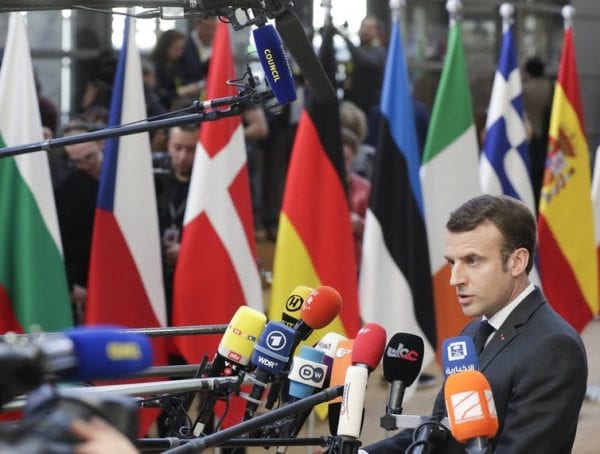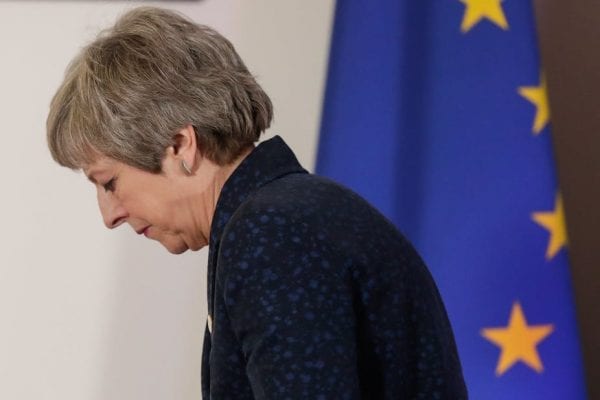Nieves Perez-Solorzano, University of Bristol
The 27 members of the European Union have responded to Britain’s request to extend the Brexit process with two deadlines, having agreed that the original Brexit date of March 29 is no longer feasible.
If the UK prime minister, Theresa May, can get British parliamentarians to approve her withdrawal agreement almost immediately, she can have until May 22 to finalise the deal. If they reject the withdrawal agreement again, the deadline will be April 12. In this second scenario, the EU27 expect the UK to indicate a path forward before the April deadline. This will then be considered by the European Council. Otherwise, April 12 could be no-deal Brexit day. Theresa May had originally asked for a deadline of June 30.
The EU’s response to the political crisis in the UK reflects some old and newer dynamics in its Brexit negotiating strategy.
From the start of the Brexit negotiations the EU has remained committed to avoiding a no-deal Brexit. It is now using the flexibility afforded by article 50 to extend the negotiation period in order to allow for a common position to emerge in the British parliament, whether around the withdrawal agreement or some other alternative, including remaining in the EU.
Yesterday, after a long negotiation, the EU27 carefully and painstakingly knitted a safety net to ensure that they remain in charge of the Brexit timetable and that the options for a way forward are not limited to a default no-deal outcome. Even though the French president, Emmanuel Macron, talked about no deal ahead of the Brussels summit, the EU27 clearly still want to find a different solution.
They have also disrupted May’s blame shifting strategy. With these deadlines on offer, she can’t say it’s the EU’s fault if no deal comes about when the withdrawal agreement is rejected by parliament.
 Macron warned that if MPs reject May’s deal, the UK is heading for no deal. EPA/Stephanie LeCocq
Macron warned that if MPs reject May’s deal, the UK is heading for no deal. EPA/Stephanie LeCocq
The EU is a risk averse organisation and the member states are committed to acting in the best interest of the EU. Both deadlines are aimed at protecting the European elections in May. The priority is to prevent any challenges to the legality of the electoral process and the subsequent make-up of the European Parliament. April 12 would be the deadline for the UK to register its intention to take part in the elections. Even though May has ruled this out, it would be a prerequisite if the UK were to end up seeking a longer Brexit extension. May 22 is the day before the elections. The EU is building a “cordon sanitaire” to ensure that Brexit does not contaminate its institutional integrity.
The EU27 are committed to speaking with one voice but the latest meeting in Brussels was an example of the multilateral nature of the consensus seeking negotiations that take place in the EU. It’s not always easy to reach a common position that both reflects each country’s national interest and the European interest. France wanted to bring the deadline forward to early May but other member states, including Poland and Germany, were willing to cut the UK some slack as the Irish Prime Minister, Leo Varadkar put it before the meeting. A unified agreement was reached in the end.
Dans les couloirs du #ConseilEuropeen art.50 pic.twitter.com/dNPomWMlyf
— Dimiter Tzantchev (@DTzantchev) 21 March 2019
As a newer dynamic, the EU is no longer only negotiating with Theresa May. It is de facto negotiating with the British parliament too. With the April 12 deadline, the EU is giving the British parliament the opportunity to coalesce around a common position without the threat of a no-deal Brexit hanging over them should they decide to reject May’s deal again. It is now up to MPs to seize this opportunity, find a cross-party consensus as to what kind of Brexit they want, and to mandate the prime minister – whomever this may be – to negotiate with an inclusive mandate.
As the Brexit endgame approaches, the EU is in the driving seat, having drawn on decades of a consensus-building culture and on the expertise of a robust negotiating team. As they respond with flexibility, understanding and some exasperation to yet another political crisis in the UK, the EU27 remain firm in their message: the withdrawal agreement will not be renegotiated, only the political declaration defining the terms of UK-EU post-Brexit relationship can be amended. A no-deal Brexit is not the preferred scenario, but the EU is ready for it.![]()
Nieves Perez-Solorzano, Senior Lecturer in European Politics, University of Bristol
This article is republished from The Conversation under a Creative Commons license. Read the original article.

